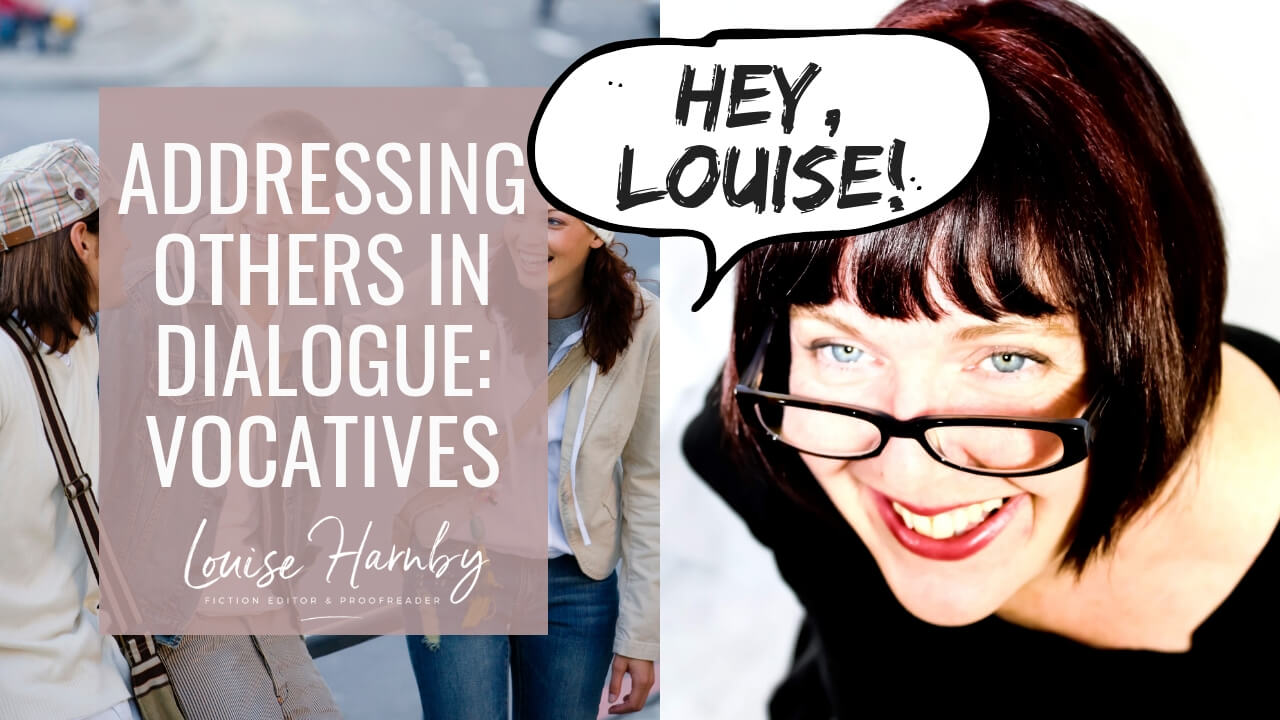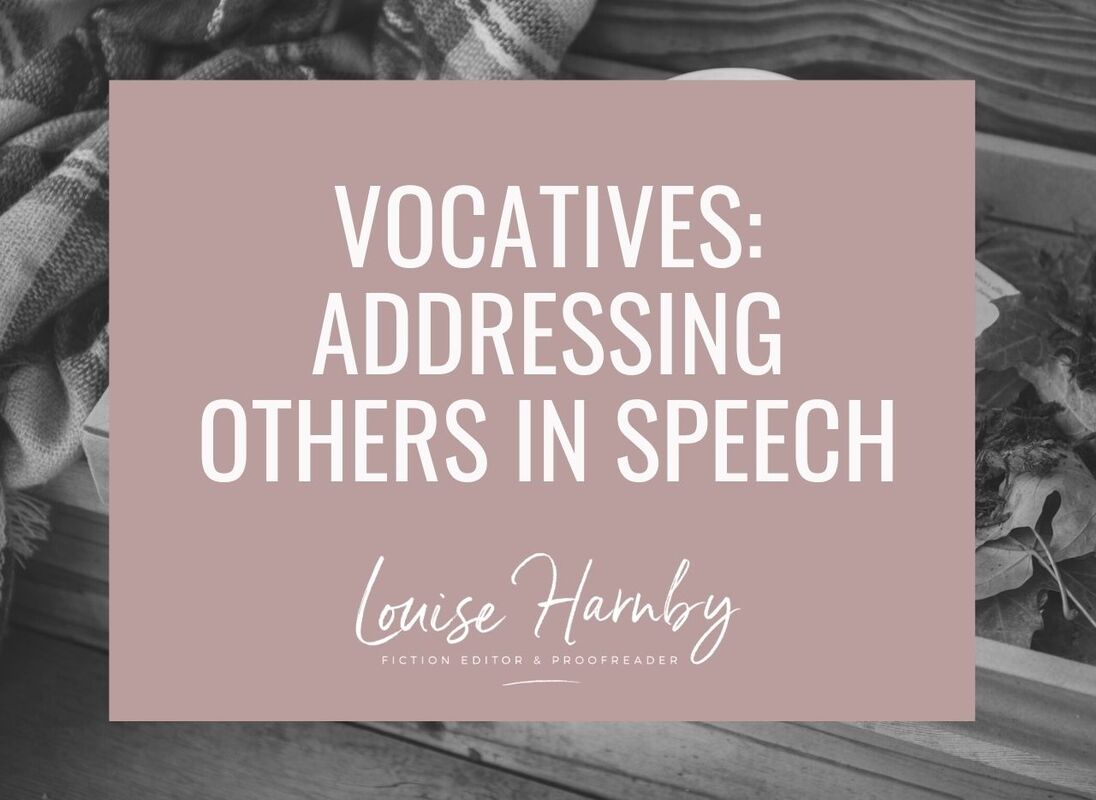|
A vocative expression is one in which a person is directly referred to in dialogue. It needn’t be someone’s name; it could be a form of address that relates to their job or position, or a term of endearment, respect or disrespect. Here’s how to work with them.
Purpose of vocative expressions
Vocatives serve several purposes in fiction writing: 1. They help readers keep track of who’s saying what to whom. This is especially useful when a character is talking to two or more people.
‘Dan, can you take the father into Interview Room 2? I don’t want him having to face the mother – not yet, anyway.’ Charlie flicked through the file and scanned down the penultimate page. ‘Deputy Douglas, I know you’re new to the team but I’d like you to handle the mom.’
2. They can enrich characters’ emotions by conveying a deeper sense of urgency, frustration, surprise or patience. 3. Readers can learn quickly about how characters relate to each other. Does one rank higher or defer to the other? Perhaps they’re friends, lovers, or loathe each other.
Overuse that distracts Overusing people’s names and titles can be grating. Vocatives aren’t the only way of signalling who’s being talked to – you could use action beats (See: What are action beats and how can you use them in fiction writing?). And if there are only two people in a scene it will be unnecessary to continually use direct forms of address. Think about the natural speech you hear in your everyday life. Most of the time, people don’t use vocative expressions excessively. Follow their lead in your novel. Compare the following examples:
The original version is much cleaner. The vocative in the first line helps to convey Vivian’s sarcasm. After that, Chandler lets us do the work and the conversation sounds natural. How to punctuate vocatives Commas are required for clarity.
Punctuating vocative expressions incorrectly can lead to ambiguity. Compare the following examples of dialogue. Notice how the missing comma changes the meaning from expressions of address to instructions to carry out acts of violence.
Lower-case or upper-case initials?
Should you use lower-case or upper-case initials when addressing a person in written dialogue? It depends. People’s names Names are proper nouns and therefore always take initial capital letters in the vocative case.
“What the hell are you doing with that novel, Louise? You’ve changed how all the vocative expressions are punctuated,” said Johnny.
‘You, Ringo, are a cad and a bounder. However, I’m prepared to forgive you because of your excellent taste in music,’ said George, thumbing through five different editions of The White Album. Terms of respect, endearment and abuse Vocative terms of respect and endearment take lower case when used generally. Examples include: madam, sir, m’lady, miss, milord, mister; buddy, sweetie, darling, love, dear; and dopehead, fuckwit and plenty more I’d love to write here but won’t!
When terms of respect are used in conjunction with names, they become proper nouns and take upper case. Endearments and insults usually remain in lower case because they’re used adjectivally.
Titles of rank and nobility Titles of rank and nobility take initial capitals when used vocatively. Examples include: Your Majesty, Commander, Constable, Agent, Lord, and Detective Inspector. Compare these with narrative text and dialogue that include indirect address forms. If the relational titles are used as names (proper nouns), we retain upper case. If we’re using common nouns with determiners (a modifying word that references a noun such as ‘a’, ‘the’, ‘each’, ‘her’ and ‘my’) we use lower case.
The commander knocked on the door and marched in without waiting for an invitation.
Fifteen minutes later, the chief called the squad into the incident room. ‘I’ve asked Inspector Harnby to take a look at the case. Hope that’s okay with you.’ ‘That other constable is a waste of space, don’t you agree, Constable MacMillan?’ Titles indicating a relationship When used as a form of direct address, relational titles take upper case. Examples include: Mother, Uncle, Dad, Auntie, Grandma and Papa.
‘I’m begging you, Dad, don’t make me watch that Jimi Hendrix docudrama again. Thirty-five times is enough.’ I smashed the guitar over the back of the sofa and stuck my nose in the air. ‘See? It’s never going to happen.’
“Oh, don't refer him to me, Mama! I have just one word to say of the whole tribe – they are a nuisance.” (Jane Eyre, Chapter 17) Again, compare these with narrative text and dialogue that include indirect address forms. If the relational titles are used as names (proper nouns), we retain upper case. If we’re using common nouns with determiners, we use lower case.
I thought back to the earlier conversation. Hadn’t his dad said we could catch the 8.15 from Waterloo if we put our skates on?
‘Can you ask your uncle if we can stay at his place this weekend?’ ‘Every grandmother receives a free cup of tea and a slice of cake. Do you think Gran would like to come?’ The guy’s mom was an absolute monster, or so he’d heard. That was just one side of the story, though. Best to check before bowling in and arresting anyone. Summing up Use vocatives as follows:
And, thank you, dear reader, for getting to the end of this article! (See what I did there?) Cited sources
Louise Harnby is a line editor, copyeditor and proofreader who specializes in working with crime, mystery, suspense and thriller writers.
She is an Advanced Professional Member of the Chartered Institute of Editing and Proofreading (CIEP), a member of ACES, a Partner Member of The Alliance of Independent Authors (ALLi), and co-hosts The Editing Podcast.
8 Comments
27/5/2019 05:08:03 pm
Enjoyed the post, Louise, and learned something NEW! Wasn't familiar with the term VOCATIVE before this, though I've been using them correctly kinda, sorta, mostly, maybe! 😂😂😂
Reply
Louise Harnby
27/5/2019 07:13:05 pm
Cheers, Felicia! I love it when I find out the name for something I knew was a thing but didn't know what to call it!
Reply
3/6/2019 10:03:33 am
This is some great and useful information. Thank you for sharing.
Reply
Lindsey Russell
4/6/2019 09:37:38 pm
It's a professional editor's job to know these things but the finer details can catch writers out. I think I'm au fait with most of them. Like "What do you think, Mum/Dad?" What I'm not so sure about is when a character is talking to someone else about a parent. Is it: "When I asked my mum/dad they didn't know anything about it."? or "When I asked my Mum/Dad . . .?" I'm inclined to think the former because the parent isn't being directly addressed but a clarification would be great.
Reply
Louise Harnby
4/6/2019 10:48:14 pm
Hi, Lindsey.
Reply
Cat
14/4/2021 12:35:21 pm
Hi, Louise. I get confused as to whether there should be a vocative comma after 'hi' in dialogue when it is just the two words. So: "Hi, John." or "Hi John." I would generally always use a comma before a name but am seeing contradictory articles when it is such a small sentence.
Reply
Louise Harnby
14/4/2021 01:24:34 pm
Reply
Cat
14/4/2021 01:56:17 pm
"Or to put it another way: those who care will notice its omission; those who don't care won't notice its inclusion!" I LOVE this. Leave a Reply. |
BLOG ALERTSIf you'd like me to email you when a new blog post is available, sign up for blog alerts!
TESTIMONIALSDare Rogers'Louise uses her expertise to hone a story until it's razor sharp, while still allowing the author’s voice to remain dominant.'Jeff Carson'I wholeheartedly recommend her services ... Just don’t hire her when I need her.'J B Turner'Sincere thanks for a beautiful and elegant piece of work. First class.'Ayshe Gemedzhy'What makes her stand out and shine is her ability to immerse herself in your story.'Salt Publishing'A million thanks – your mark-up is perfect, as always.'CATEGORIES
All
ARCHIVES
July 2024
|
|
|
|
























 RSS Feed
RSS Feed





